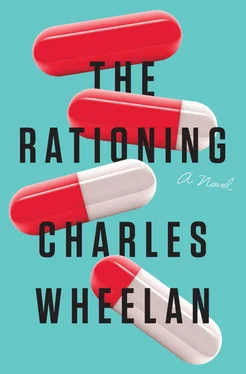“He wrote about it in his autobiography,” the Strategist explained.
“Fine, but for my benefit, can we please not call him a rug merchant?” the Secretary of State said. (In her memoir, she would describe herself as “horrified” by the Strategist’s manners but “simultaneously impressed” by his depth of knowledge on myriad topics.)
The Strategist, taking no offense, replied, “I don’t care what we call him. The point is that he sees the world as a zero-sum game—everything. If we win, he loses, and vice versa.”
“I would agree,” the Ambassador offered. “He’s hard to deal with that way.”
“We need to make him think he’s getting a huge win and that we’re somehow losing,” the Strategist said.
“That seems difficult, given the circumstances,” the Ambassador said earnestly. “How does the U.S. lose by getting Dormigen that’s going to save thousands of lives?”
“We suggest that we can’t give him what he most wants,” the Strategist said.
“Publicity,” the Secretary of State offered.
“Exactly,” the Strategist said, impressed his pupils were keeping up with him. “The PM wants a political win, domestically and on the international stage. We tell him that won’t be possible. We appreciate his Dormigen offer, but the President is not comfortable appearing dependent on a developing country to protect—”
“Do not refer to India as a developing country,” the Ambassador said firmly. “He will be very sensitive to that.”
“Of course he will!” the Strategist blurted out, now exasperated that one of his pupils was falling behind. “Not that people tend to confuse India with Switzerland, but still, you’re correct, so we need to exploit that sensitivity. What better way for India to signal its economic progress than to bail out the richest country on the planet?”
“I agree,” the Secretary of State said.
“Okay, so what next?” the U.S. Ambassador asked.
“You need to set up a meeting with someone in the Prime Minister’s office,” the Strategist instructed the Ambassador. “Tell them it needs to be confidential. Request to meet in a shopping mall, or a restaurant, or someplace like that. Tell them the President is very sensitive to appearing as a supplicant—yes, use that word, ‘supplicant.’”
The Secretary of State added, “Especially after the polling data showing what a huge political win this would be for the PM.”
“Yes, exactly! Good,” the Strategist said. “And then when they hint at a Dormigen offer, which they will, you must make clear that the President would be willing to accept the Dormigen, but the deal would have to be confidential, or at least very low-key.”
“And how does the President really feel?” the Ambassador asked.
“What do you think?” the Strategist answered impatiently. “The President just wants the Dormigen. The Indian PM can ride it down Fifth Avenue on a white horse, if that’s what he wants.”
“This feels like a long shot,” the U.S. Ambassador said. “We’re treating a head of state like Br’er Rabbit.”
“First of all,” the Strategist said, “Br’er Rabbit was the one who got thrown in the briar patch, so technically we’re treating the PM like the fox. Second, we’ve got no other fucking options. And third, I’ll bet you my left testicle it works.” [28] We know this was the exact language the Strategist used, as the Secretary of State devoted a page and a half to this conversation in her memoir.
THE CONGRESSIONAL BRIEFING BY THE ACTING HHS SECRETARY was somewhat anticlimactic after the Speaker’s press conference. The President had already spoken at length with the Senate Majority Leader and many of the Conventioneers. The Communications Director had released the key points of the briefing five minutes before the Acting Director began speaking, creating an odd situation in which members of Congress were getting texts from their staffs giving them the key points of the briefing they were waiting to receive. The Speaker tweeted that this was “beyond insulting,” prompting the Communications Director to tweet back (publicly, of course), “Key 4 America should be content of briefing, not who gets it when,” at which point the Chief of Staff ordered him to disengage.
For those of us working on the Outbreak from the beginning, the congressional briefing was old news. The Acting Secretary walked through the details of how we got to this point (including the arrest and indictment of the Centera Pharmaceutical executives); the efforts the administration was making to gather Dormigen from other countries; the scientific advances that had been made with regard to the virus. The chamber was loud and unruly, as staffers scurried about and members studied their devices for details of what the Acting Secretary was about to tell them. After a few minutes of what felt like prefatory remarks, the Acting Secretary turned to the essence of the briefing, the “what now” part, and although nearly everyone in the chamber knew what was coming, the noise dissipated and most eyes turned to the Acting Secretary as he stood in the well of the House. “As you are well aware,” he intoned, “even with all of the efforts I have just described, it is increasingly likely that we will find ourselves with an insufficient supply of Dormigen to meet our basic needs.”
There were hisses and catcalls in the chamber. “Not in America!” someone yelled from the Acting Secretary’s left. “No rationing!” came another cry. The outbursts felt choreographed, as they probably were. Someone who heard only the audio, as opposed to sitting in the august House chamber, might assume they were listening to a high school principal lecturing unruly students. Of course, if I am being honest, the briefing itself was mostly theater, too. The President had instructed the Communications Director, “Just tell them enough to keep them busy.” Still, it was the public’s first official glance at what lay ahead as the Dormigen stocks were depleted.
The Acting HHS Secretary continued: “Despite our best efforts to conserve Dormigen in recent days, we are now projecting a shortfall for several days before plentiful new supplies of Dormigen can be produced. This is a short window, not quite four days according to our most recent calculations, but during that period we anticipate that not every patient who would normally benefit from Dormigen will have access the drug.” There was more hissing and jeering, but the Acting Secretary’s calm, avuncular tone took some of the negative energy out of the chamber. He continued: “In consultation with physicians and medical ethicists, we have developed a contingency plan—a plan, by the way, that we still hope will not be necessary—to allocate the available Dormigen supplies in a way that will offer the greatest possible health benefits. The available Dormigen will be prescribed where it can do the most good, and doctors will be discouraged from using the drug when the benefits are likely to have the least impact.” This last bit had been run past focus groups repeatedly, despite the confidential nature of the plan. The Strategist had been able to get groups to respond to a “hypothetical situation” in which the captain of a cruise ship adrift at sea had to explain how the dwindling food supplies would be allocated among the passengers. “The exact details of our plan are explained in the briefing packet that we have distributed,” the Acting Secretary said.
“Old people to the right!” someone yelled from the floor.
“Rich people to the left!” a different voice responded.
The Acting Secretary seized on a momentary pause to interject, “I will now answer any questions you may have.” The exact details of the Dormigen rationing were laid out in small print in the documents distributed in the congressional briefing packets: the age cutoff; the kinds of illnesses that would render patients ineligible for Dormigen; the penalties for physicians who did not comply with the protocol; and, of course, “a range of estimated incremental preventable fatalities”—right there, two-thirds of the way down page eleven. Many of the members of Congress scurried out of chamber, eager to get on camera or to push their inspired thoughts out on social media. Predictably, these missives were long on vitriolic criticism of the “White House rationing scheme” [29] Language worked out in the progressive caucus that the Tea Party subsequently adopted as well.
and short on alternative suggestions. The Acting Secretary patiently answered questions from the members of Congress and staff who remained behind, but it soon became apparent that most of the questions were not really questions (“Isn’t it true that…”). Nor were most of the Acting Secretary’s answers really answers. He showed remarkable discipline, repeatedly referring questioners to “the briefing document you have received” and answering even the most asinine suggestions with, “We will take that under advisement.”
Читать дальше












